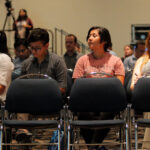A Student’s Lens
When presented with words like “literacy”, “fluency”, and “rhetoric” in class this week, I assumed that the definitions of them that I was familiar with would prepare me for our discussion. However, much of this discussion was actually spent defining these three words. After about an hour of back and forth discussion, I can’t say we as a class came to a perfect consensus. There were no unanimously agreed upon definitions, at least for “literacy” and “fluency”. As I walked out of class and processed what we’d talked about, I was fascinated. Everything that was said made perfect sense, yet left me confused, and this is a good thing. This confusion opened my mind to new interpretations of concepts I thought I knew well enough, which prepared me for the readings we were given.
Developing Literacy
Of the two readings assigned, I definitely found myself agreeing more with Hawisher and Selfe. These two women described trends they observed in the stories of ordinary people navigating digital literacy. Because these stories were coming from every day people, I was able to see some of myself in their experiences, and the conclusions Hawisher and Selfe drew seemed perfectly reasonable based on that.
Some of the trends that Hawisher and Selfe observed included, but were not limited to:
- Literacies having lifespans
- Different factors possibly being barriers to certain literacies
- Literacies could move upstream (child to parent) as well as downstream (parent to child)
- Sometimes teachers missed their students’ literacies from outside the classroom
These were things I had noticed in my own life as well. I grew up at a time where computers were already more common in the household than not. Still, it was early enough that they weren’t an integral device in my upbringing. Unlike Britney Moraski, one of the participants of Hawisher and Selfe’s interviews, my digital literacy developed separately from my ability to read and write. I did not have an email until middle school, and it was only around that time that I started using the internet to message friends, or watch videos on my own time for entertainment rather than for education.
Once I developed digital literacy, it did noticeably move upstream rather than downstream, at least with my mom. Even to this day, there are things my mom doesn’t quite understand about computers or her own smartphone. Just recently, she had tried to send me the link to an information page, but she had sent it through Apple’s Cloud. My phone is not an Apple phone, and as such, I do not have an Apple ID, which was needed in order to see the information. I then had to show her that she could instead just copy the URL of the webpage to her phone’s clipboard and send that to me.
And Then There’s Gee
Paul Gee also discusses literacy in his article, defining it as “mastery of or fluent control over a secondary discourse“. This seemed like an interesting definition to me, in that it uses the word fluent to define the word literacy. In my mind, those two concepts are distinct. They are similar, but there is a key difference between them. Gee, however, conflates the concept of “Literacy” with the concept of “Discourse” (with a capital D), and suggests that one cannot be literate without being fluent.
On one hand, I agree with his assessment. In the way that he describes, you can’t claim to be part of a Discourse (an in-group) unless you have fluency in that Discourse. Understanding some anatomy does not make you a doctor, being able to speak English does not make you a Linguist, etc. However, it is the conflation of Discourse and Literacy that I take issue with. Selfe and Hawisher’s concept of literacy is more broad, and it is this idea that I agree with more. Literacy does not require fluency. You can have the skills without being a master.





Leave a Reply